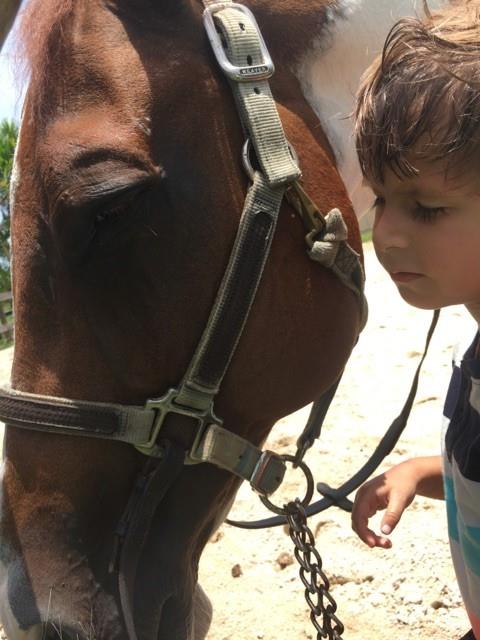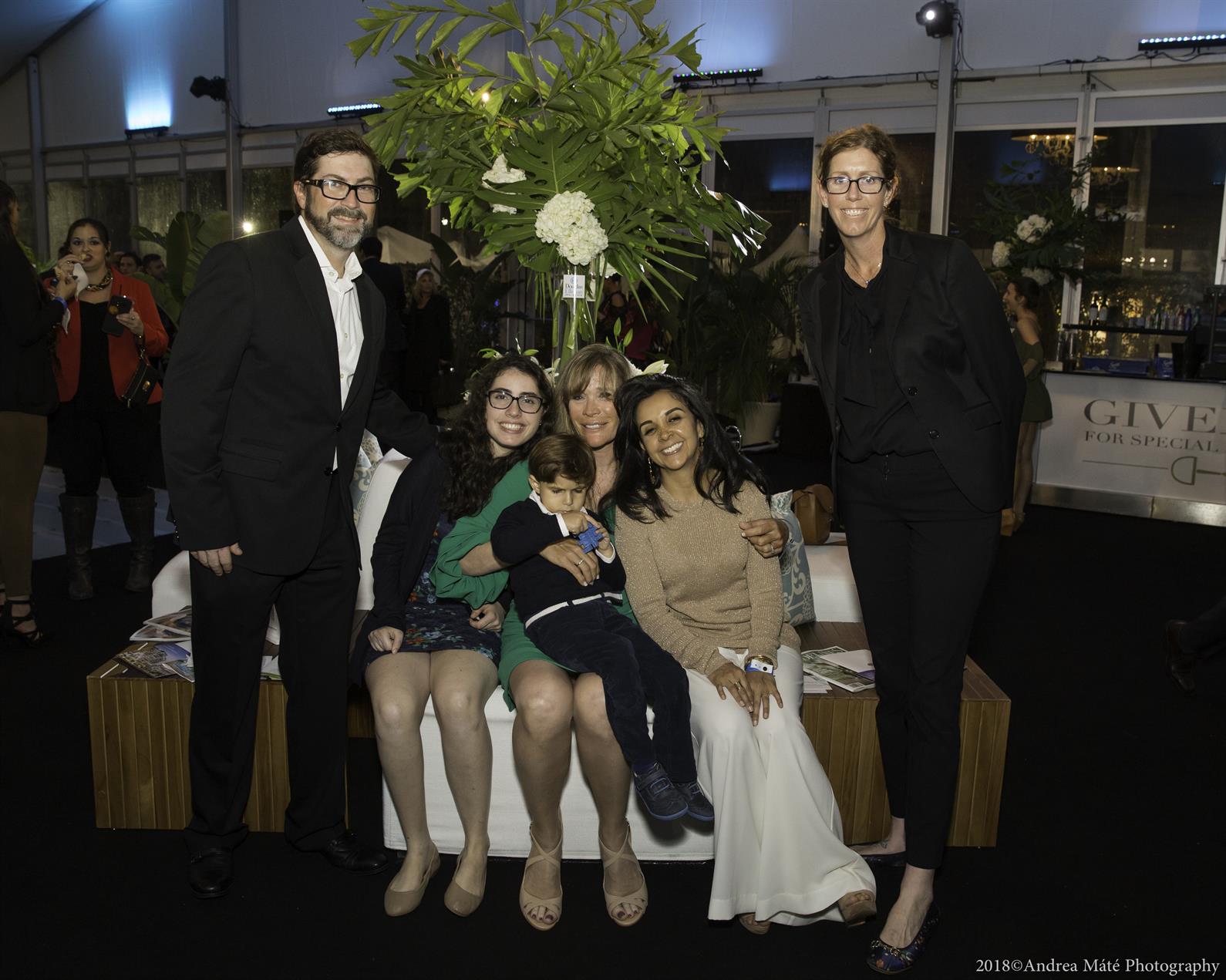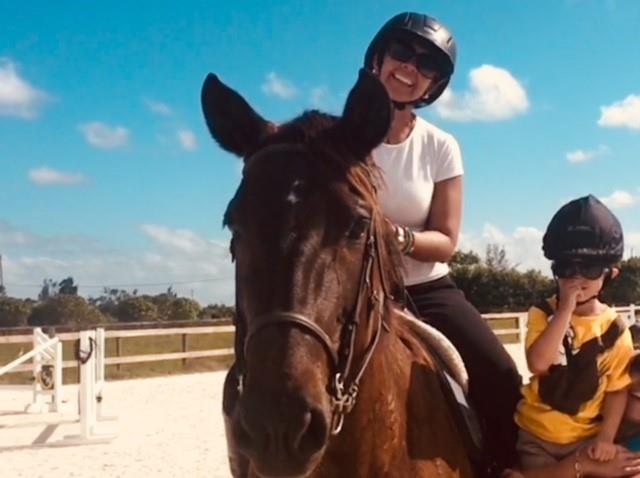Ethan Simmons and his mother Maria Cristina Velasquez Simmons know better than most how horses can transform a person’s life.

Photo: Courtesy of Cristina Simmons
Ethan, a six-year-old in Miami, Fla., was diagnosed with autism when he was three. He would not speak and, Cristina says, “He had a general poor development curve, so he had issues from the very beginning with walking and with balance.”
From an early age, activities that required coordination, like throwing or catching a ball and playing soccer or football, were difficult for Ethan. “He couldn’t coordinate two movements, so he also had trouble riding a bicycle or a scooter, anything that required coordination of multiple movements,” said Cristina, a single mom who works in risk-compliance for a national financial firm in Miami.
But he’s improved dramatically since then, she says, thanks in part to three years spent in the company of horses.
“In the last three years, he’s gone from not being able to run properly to being able to run like a normal kid and being able to play with a ball and with toys,” Cristina said. “He handles his balance much better. He is improving his social skills and in his ability to connect with you. I think a lot of this comes from horses and the horse environment.”
Ethan Simmons is one of the special-needs equestrians who has benefited from the Florida-based non-profit Give Back to Special Equestrians. The all-volunteer organization—founded by Sissy DeMaria-Koehne, Dr. Heather Kuhl, and Isabel Ernst in Vero Beach, Fla., in 2013—provides therapeutic horseback riding and equine-assisted scholarships for disabled children and veterans through its partner stables in New York and Florida.
Give Back for Special Equestrians aims to share the joy of horses and horsemanship with those

Photo: Andrea Máté Photography
facing some of life’s most difficult physical, emotional, and mental challenges and to enable them to experience the life-changing benefits of horsepower that heals. Through its Young Ambassador program, youth between the ages of seven and 17 are encouraged to pay forward their blessings through active volunteerism. Young Ambassadors meet monthly during the school year and assist with a variety of fund and“friend” raising activities.
Give Back for Special Equestrians—formerly known as Give a Buck for Special Equestrians—recently raised more than $15,000 during the Douglas Elliman Winter Equestrian Festival $384,000 Grand Prix in Wellington, Fla.
Hosted by Douglas Elliman Real Estate, grand prix show jumping champion Georgina Bloomberg, and a stellar group of donors and supporters, the ringside gala contributed funds that will support 15 annual therapeutic riding scholarships for special-needs equestrians, said co-founder Sissy DeMaria-Koehne.
That’s going to help people like Ethan and Cristina.
“The scholarship has made a huge difference,” said Cristina, who believes that contact with horses and the community of people around them has done her son a lot of good. Now she’s riding, too. “Every time he sees me on a horse, he gets super-happy, because he’s on a horse, too. That’s made a huge impact on him. It’s not only about showing Ethan what we can do and what we can enjoy, but it’s also helped me to conquer my fears and to be more calm. The calmer I am, the better the horse responds, and that gets me into the same type of state that helps me in my relationship with Ethan.”
Ethan Simmons first connected with horses about three years ago at Foundation La Ventana de los

Photo: Courtesy of Cristina Simmons
Cielos, a farm south of Miami, Fla. “It’s really peaceful,” Cristina said of the farm, which offers programs that allow people of all ages with a variety of disabilities to interact with different animals, including cattle, sheep, and horses. “That was where he first approached horses. He started by just getting close to the horse or touching it, and then he started to ride—not therapeutically, but just like a typical pony ride. Then I was able to find a certified therapeutic place, Good Hope Equestrian Center, and that’s where he started serious, structured horse therapy a year ago.
“He always liked horses and never showed any type of fear of them, which was impressive,” Cristina continued. “He really found them perplexing, because they are way bigger than him! But you can see the connection he has with them. I saw that he enjoyed it, and I noticed that some of the things he was doing in physical and occupational therapy can also be done on a horse. I had ridden horses in the past, when I was little, and I knew that it requires more stability and concentration, but at the same time it relaxes you. So my train of thought was that he could do these things on a horse, and it would be a lot more beneficial if it’s done with professional guidance.”
Watching Ethan’s progress over the last several years, Cristina can point to specific benefits she attributes to therapy with horses—most notably, Ethan’s improved balance. “And his core muscles have strengthened dramatically,” she said. “He’s also definitely calmer now. I think horses have therapeutic calming results for him. He has also changed socially, too. In the past, he didn’t even look you in the eye, but now he does. He smiles a lot more and laughs. He makes noises and, from time to time, he’ll invite someone to play ball with him.
“I’m extremely grateful for the opportunity,” Cristina added. “The scholarship has opened a window to connect my son to the horses in a personal way by seeing me doing the same thing he’s doing. It’s priceless to see his reaction. The horses have been more than a positive, and I can definitely recommend them to anybody. Therapy with horses is a great way to improve life physically, mentally, and emotionally, regardless of the condition you have. And even for people who don’t have a condition, it’s a great way to de-stress.”
Want articles like this delivered to your inbox every week? Sign up to receive the Equestrian Weekly newsletter here.
This article is original content produced by US Equestrian and may only be shared via social media. It is not to be repurposed or used on any other website than USequestrian.org.


